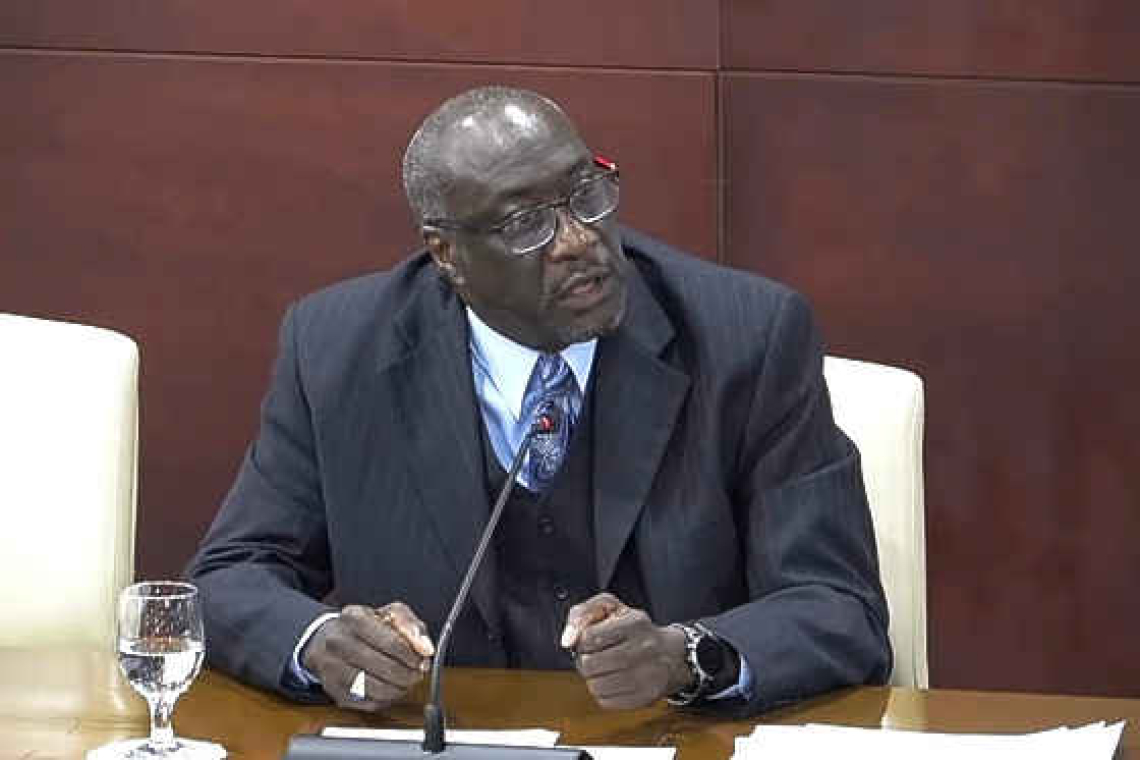Julio Romney in Parliament on Thursday.
PHILIPSBURG--Parliamentary seats that are obtained during an election belong to the political party they were assigned to and not individual Members of Parliament (MPs). MPs also do not have a right to declare themselves as independent Members of Parliament.
These were amongst the positions expressed by political analyst Julio Romney during a meeting of Parliament’s Ad Hoc Committee on Electoral Reform on Thursday. Some MPs did not see eye to eye with some of his positions.
Romney told MPs that the crux of St. Maarten’s political conundrum is party representatives in Parliament circumventing the election system resulting in instability and stagnation in government.
“Over the years, MPs have been indiscriminately declaring themselves as independent from their respective elected political party, thereafter aligning with a different political party or parties, thus causing the duly elected government to fall and calling of new elections,” stated Romney.
“While this, declaring as an independent MP continues today, said declared independent Members of Parliament are now shying from aligning with a different political party and or parties and opting to sit in Parliament as an independent new faction.”
He said this fosters minority support in Parliament with the MPs in question positioning themselves as the balance of power in Parliament. This development, he contends, is inconsistent with democratically elected representatives and the scheme of the country’s election system, warranting the need for electoral reform in this particular area.
“There are those that believe otherwise and contend that they have won the seat and justifiably can declare themselves as an independent Member of Parliament. They are to be referred to Article 47 of the Constitution, section 2, of its explanatory memorandum, which unequivocally states that the distribution of seats and membership in Parliament is based on a system list, which is political parties, not a system of persons or candidates. And every political party is assigned a number of seats in Parliament in proportion to the number of votes cast for that political party,” he noted.
According to Romney, this is reflected further in Article 95 of the Election Ordinance, which he said plainly states that the Central Voting Bureau shall divide the sum of the voting figures of all political parties by the number of seats to be filled in Parliament. The result of the division is referred to as the electoral quota. Seats will be assigned to political parties as many times as the electoral quota is included in the voting figure of that party list.
Article 98 further states that for the purpose of filling seats allotted to each political party, seats are assigned in order of the candidates with the highest number of votes on that political party list.
“This clearly debunks any notion that the seat belongs to the candidate or Member of Parliament,” Romney insisted. “In addition, if parliamentary seats were to belong to the MP, said independent MP would be looking forward to defending their supposed seat in Parliament and not in search of a political party home to contest the upcoming election, and hopefully their selected party is allotted seats in Parliament and they have gotten enough votes in the party to be assigned a seat and be returned to Parliament.”
He also spoke of misinformation being peddled in Parliament. “We have also heard the false narrative on the floor of Parliament that MPs have a right to declare themselves as an independent Member of Parliament. I... stand [to be – Ed.] corrected, but where in the statutory order is it explicitly or implicitly mentioned that MPs have a right to declare themselves as independent MPs?” he asked.
In searching for an answer, Romney said as part of the ongoing white paper research with the working title “The Evolution of the Kingdom of the Netherlands – St. Maarten Perspective”, he put the question to the Central Voting Bureau.
He asked based on which statutory order or orders are MPs allowed to declare themselves as independent MPs and enquired whether independent MPs are legally permissible.
He also enquired as to which constitution or statutory order allows Parliament to accept and recognise MPs “indiscriminately declaring” themselves as independent MPs, “effectively superseding the statutory principle of proportional representation and voiding the ministerial regulation that has established the composition of Parliament based on electorates’ prose.”
A copy of his queries was also sent to Parliament and the Electoral Council in October 2022, also seeking their perspective on the matter, but to date no response has been received.
Romney stressed that the need to address these “disturbing factors” is what has generated the debate for electoral reform.
“In response, some years ago, I drafted and submitted to Parliament a draft election ordinance amending legislation. The draft legislation sought to reform election systems by amending Articles 95, 96, 97 and 98 of the Election Ordinance with the purpose to ensure the sanctity and rightful democratic elected representation in Parliament and political stability on the island and in addition, to provide for a more enhanced mathematical process when allocating seats in Parliament – The D'Hondt method,” stated Romney.
The D'Hondt method, also referred to as the Jefferson method or the greatest divisors method, is a method for allocating seats in Parliaments or in party-list proportional representation systems. It belongs to the class of highest-average methods.
Following Romney’s presentation, a number of MPs weighed in on the issue, with some not seeing eye to eye with some of Romney’s positions.
Independent MP Solange Ludmila Duncan, for example, said the issue of MPs declaring themselves independent is not a St. Maarten phenomenon. She believes that St. Maarten has to evaluate this issue, not from a place of emotion, but looking at structure and what works for the country and its culture. “It’s deeper than surface level,” MP Duncan maintained.







